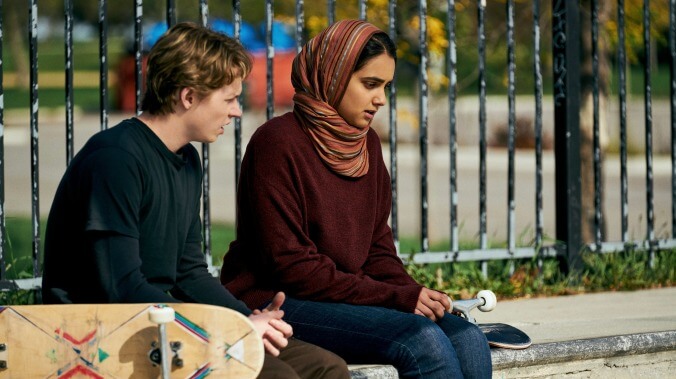The quietly extraordinary Hala is a coming-of-age story that’s becoming more common


The most striking part about Apple TV+’s Hala is the quietness it quickly settles into. This coming-of-age tale doesn’t feature sudden bursts of background pop music or the central teenager, Hala Masood (Blockers breakout star Geraldine Viswanathan), spiraling loudly or openly. No, she is a Pakistani American living in suburban Illinois with strict, traditional parents. She doesn’t have the freedom to rebel publicly, at least not until she finds that she can no longer suppress her outsize emotions. Writer and director Minhal Baig’s approach to storytelling starts with building up its scenery—the simple Masood house, a mostly empty skate park, dimly lit roads at night, an English classroom. The camera often zooms in to the characters’ expressions, which allows Viswanathan to take advantage of every lingering, close-up shot of her face to deliver a subdued and moving performance.
Hala, which premiered at the Sundance Film Festival earlier this year before being purchased by Apple, immediately stands out despite existing in the same storytelling space as films like Lady Bird, Eighth Grade, The Edge Of Seventeen, or even television shows like Apple TV+’s Dickinson. Its perspective, that of a young Muslim girl struggling to bridge the divide between her devout family and her own individuality, is one still rarely seen on film or TV. Baig subtly establishes the different parts of Hala’s identity, from entering her bilingual home—her mother, Eram (Purbi Joshi), speaks only in Urdu, while Hala responds in English—to revealing Hala’s hunger for the kinds of cuisine not found in her mother’s kitchen.
The first half develops Hala’s bicultural identity just as she is coming to discover it herself. She prays every day, wears the hijab, and is clothed from head to toe; while the rest of the girls in her gym class change into shorts, she wears full-length track pants. She also loves poetry and is unafraid to recite her insightful verses out loud in class (an especially poignant one in the beginning about the silences between words serves as quite the metaphor for the film’s introspective attitude). Hala is sexually curious and has discovered the pleasures of novice masturbation. She loves going to the skate park and is really into her blue-eyed classmate Jesse Ross (Jack Kilmer), who shares similar interests.
Hala’s challenge lies in unveiling a complex story and character to an audience that might not be familiar with the specific turmoil Hala is going through. At its core, Hala’s journey is a familiar one: She’s just a kid figuring out who she is. However, she’s also an immigrant who doesn’t relate to her parents’ conservative upbringing in Pakistan, especially when she is surrounded by kids who aren’t burdened by the same constraints. She longs for freedom from scrutiny and the feeling of being trapped under cultural and societal pressures. The limitations imposed upon her go beyond an early curfew: She isn’t really allowed to speak to any boys in school, knowing full well she’ll have to marry a fellow Muslim. Early on in the film, she learns her parents’ marriage was arranged so she asks her father, Zahid (Azad Khan), whether he loves her mom. His response, the impact of which isn’t fully felt until the film’s climax, will resonate with anyone in the diaspora.
As Hala moves into its second act, we learn more about the family’s secrets and how patriarchal their household actually is. It’s also when the film’s strongest element, that of the bond between Hala and Eram, really shines through. Like Lady Bird, which also explored a complex daughter-mother relationship, Hala also sends these two women on an emotionally fraught journey together. Their strained relationship turns from difficult to sympathetic to, finally, a place of understanding. We learn that what Eram wants most for her daughter is what she herself was denied: personal agency.
This specific, determined type of storytelling comes only from personal experience, one Baig has taken care to represent on screen. She’s spoken in interviews about how her own life informed Hala; the episodes of Ramy and BoJack Horseman she’s written further prove her grasp of the subject matter. Hala does stumble a little in its third act, but by the end, Baig has set her two female protagonists up to succeed, despite their past circumstances and Hala’s growing pains. The film is a noteworthy addition to the coming-of-age genre because it reinforces the idea that these stories simply cannot be defined by a singular frame of reference anymore. That change is already underway thanks to Blockers, Prarthana Mohan’s MisEducation Of Bindu, Gurinder Chadha’s Blinded By The Light, and even Netflix romantic comedies like To All The Boys I’ve Loved Before. Like them, Hala shines a new light on the tropes of teenage self-discovery.